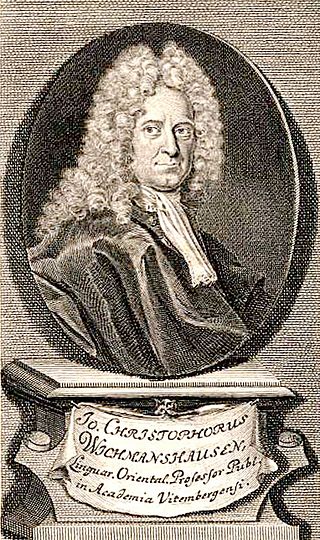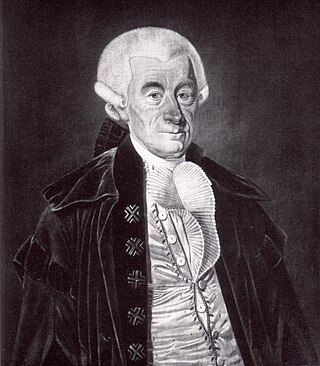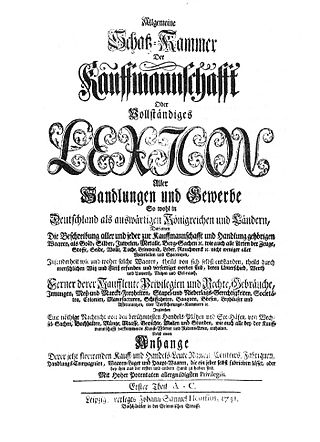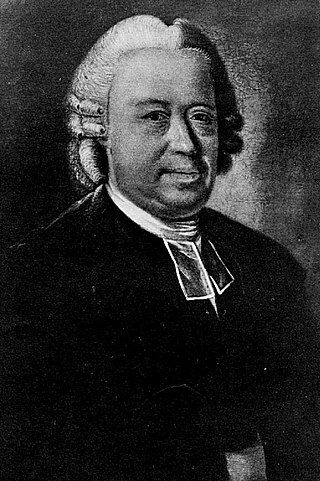
Johann Gottlieb Heineccius was a German jurist from Eisenberg, Thuringia.
Throughout his life as a musician, Johann Sebastian Bach composed cantatas for both secular and sacred use. His church cantatas are cantatas which he composed for use in the Lutheran church, mainly intended for the occasions of the liturgical year.

Christian Gottfried Körner was a German jurist. His home was a literary and musical salon, and he was a friend of Friedrich Schiller.

Johann Christoph Wichmannshausen was a 17th-century German philologist.
Eucharius Gottlieb Rink was a German jurist, heraldist, numismatician, and imperial counsellor. His name may also be spelt as Rinck, Rinckius, or Rinkius. He was a member of the Rink von Dorstig family, which obtained a title of nobility in the 15th century.

Lorenz Christoph Mizler von Kolof was a German physician, historian, printer, mathematician, Baroque music composer, and precursor of the Enlightenment in Poland.
Christian Frederick Matthaei, a Thuringian, palaeographer, classical philologist, professor first at Wittenberg and then at Moscow.

Johann Stephan Pütter was a German law lecturer and publicist. He was professor of law at the university of Göttingen from 1746 until his death. He exerted great influence on the law institutions of his time. His principal work is Historische Entwicklung der heutigen Staatsverfassung des Deutschen Reichs.

Johann Samuel Heinsius (1686–1750) was a German bookseller and publisher based in Leipzig, best known for the works he published in collaboration with Johann Heinrich Zedler.

Christian Wilhelm Franz Walch was a protestant German theologian and professor of theology from Göttingen. He authored numerous books.
Scherwenzel or Scharwenzel is a 16th century, German, gambling game played with cards and named after the Unters or Jacks that had special privileges. It appears to have been an elaboration of Grobhäusern or Färbeln played in Germany, Poland, Silesia and Bohemia, but especially in Bavaria in which the Unters were variously known as Scharwenzels, Scherwenzels, Scherers or Wenzels. They, and to some extent also the Nines, functioned as wildcards. According to Adelung, Grobhäusern, on which it was based, was "far simpler than Scherwenzeln".

August Friedrich Müller was a German legal scholar and logician.

Johann Friedrich Weidler was a German jurist and mathematician.

Johann Jakob Schmauss was a German jurist, historian, and university professor.

Johann Sithmann (1602–1666) was a German jurist, Professor of Pedagogy at the University of Greifswald and author, known from the 1657 publication Idea Arboris Consanguinitatis & Affinitatis Theoreticae & Practicae, and other works.
Bartholomäus Gesius was a German theologian, church musician, composer and hymn writer. He worked at Schloss Muskau and in Frankfurt (Oder) and is known for choral Passions in German and Latin and for the melody and first setting of the Easter hymn "Heut triumphieret Gottes Sohn", which was used in several compositions including a cantata by Dieterich Buxtehude and a chorale prelude by Johann Sebastian Bach, concluding the Easter section of his Orgelbüchlein.
Johann Andreas Michael Nagel was a German Hebrew scholar and Orientalist.

Johann Wilhelm Hoffmann was a German historian, jurist and writer.

Johann Christoph Bohl or Bohlius or Bohle (1703–1785) was a physician fr4om the Kingdom of Prussia.
Johann Gottfried Teske was a Prussian physicist and philosopher who is best known for his collaboration with Immanuel Kant on his work De Igne.













